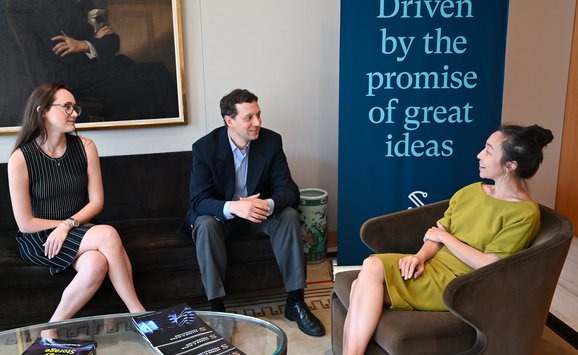In RFF’s Supporter Spotlight, we hear directly from donors about their commitment to issues in climate, energy, and the environment; how they make a difference; and why they support Resources for the Future—all in their own words.
Resources recently spoke with Paul Joskow, the Elizabeth and James Killian Professor of Economics Emeritus at the Massachusetts Institute of Technology (MIT) and president emeritus of the Alfred P. Sloan Foundation. Below are excerpts from the conversation, which touched on RFF’s history, its unique role in a politicized landscape, and more.
Resources magazine: How did you become interested in environmental and energy issues?
Paul Joskow: It goes back to when I was writing my thesis in the early 1970s. I was interested in regulation, and I ended up focusing on state regulation of electric utilities, because a lot of useful data were being collected. Back then, electric utilities were vertically integrated, and once I got involved with them, I became interested both in energy more generally and in the effects of electricity production on the environment.
When I came to MIT as a professor in 1972, I was recruited to participate in what was then the MIT Energy Laboratory. Through working with faculty and staff at MIT, I became interested in a larger set of energy issues and associated environmental issues—nuclear power, coal, gas, and others—and things have gone on from there.

Paul Joskow with the late Congressman John Lewis at Yale
What do you see as the value of RFF within the broader policy landscape?
As president of Sloan, I abided by the IRS rules about 501(c)(3) organizations to the letter, which meant that I didn’t want to fund advocacy work that crossed the boundaries into lobbying. Many DC-based organizations have become politicized. RFF was one of the only DC think tanks I felt comfortable funding, because RFF does excellent nonpartisan research. RFF interacts with people in government, of course, but it’s focused on research and outreach about its research—without engaging in partisan lobbying.
What originally brought you to RFF? What continues to keep you engaged as a donor to RFF today?
My connections with RFF also go back a long way. I started to engage with people from RFF in the 1970s—folks like Sam Schurr, Hans Landsberg, and others. After the first oil shock in the early 1970s, RFF researchers led a couple of comprehensive studies looking at policy reforms that could enhance US energy security. I also recall some very interesting work on water use, multipurpose river development, the role of dams, and other things.
When I became president of the Sloan Foundation in 2008, it didn’t have an energy and environment program, so I decided I wanted to start one. Sloan ended up making many grants to RFF. When Richard Newell became president, RFF research became more focused on climate change and decarbonizing the electric grid. I had known Richard since his leadership at the Energy Information Administration and then when he moved to Duke University, so my professional interests and personal relationships both increased my connection to RFF.

Paul Joskow with his wife Barbara
Since I left Sloan, I’ve made contributions to RFF as an individual donor because I appreciate the work that RFF is doing. I’ve tried to keep up that support, and I’ve kept up connections with people who work at RFF, as well, on research projects that interest me.
Is there anything else you think sets RFF apart from other organizations? What makes RFF special?
If you’re the president of a foundation, as I was for 10 years, the worst thing to start your day is to receive a phone call from one of the foundation’s trustees who is complaining that a grantee has produced a terrible piece of work. I’ve always trusted RFF to educate policymakers and the media, and never to embarrass me or the Sloan Foundation. The researchers are high quality, and they publish peer-reviewed papers in academic journals. To me, that kind of peer review is needed to stimulate—and, in a sense, certify—the best research.
I view RFF as the best think tank in the world that’s focused on environmental economics and related policy issues. I’ve always been confident when supporting RFF, whether as an individual or on behalf of the Sloan Foundation, that the funds would be well spent—that RFF researchers would do what they said they were going to do, and they would do it well.

Paul Joskow on vacation with his family


Four Ways You Can Support RFF
- Give through our website: Visit www.rff.org/donate to make a one-time donation, or to set up a monthly recurring donation.
- Give through the mail: Send your check to Resources for the Future | 1616 P Street NW, Suite 600 | Washington, DC 2003
- Give through a donor-advised fund: Donate through a DAF account at a community foundation or financial institution to support RFF while receiving favorable tax benefits.
- Give through a will, trust, or gift plan: Include RFF in your estate plans to provide meaningful, long-lasting support.
Discover other ways to give at www.rff.org/donate/ways-giving or contact Ryan Sabot at [email protected]






